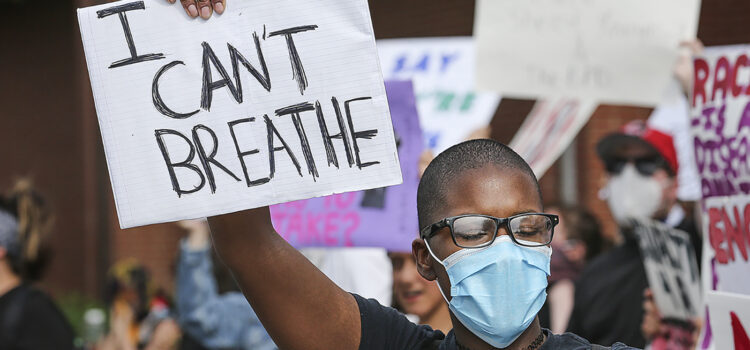
The Bakersfield Police Department Chief and Assistant Chief said it’s time for changes in law enforcement practices and committed to making those changes.
Nearly 300 community members joined BPD Police Chief Greg Terry, BPD Assistant Chief Joe Mullins and a number of local African American leaders — including ShePower Leadership Academy founder Arleana Waller, Kern County Democratic Central Committee representative Tahlua Goosby, Panama Buena Vista School Board member Keith Wolaridge, and KCSOS HR Director Traco Matthews — for a conversation about recent protests taking place throughout Kern and the effects George Floyd’s death has had on the community.
“I want to look forward,” said Terry. “For far too long, the police have decided what the community’s needs are…It’s time to make some changes, and I am ready to do that.”
The BPD officer also committed during the Zoom panel discussion Tuesday to supporting more transparency with the community regarding police practices.
“I have no problem telling you I 100 percent support transparency,” said Mullins. “If we want to be trusted, we have to be worthy of gaining your trust.”
Patrick Jackson, the president of NAACP’s Bakersfield branch, said law enforcement in Bakersfield have been protected time and time again because of the Peace Officer’s Rights.
“You can’t change anything until the policy is changed,” Jackson said of the Peace Officer’s Rights.
Terry said the department has already begun tracking data to help the department make better decisions when it comes to racial equity. The department has begun tracking traffic stops and the racial demographics of the community members involved; performance and behaviors of officers; and complaints against officers.
However, some local leaders say this isn’t enough. Some leaders called for the department to make this information available to the public, while others urged the department to have external accountability by establishing an advisory committee made up of community members to monitor law enforcement behavior.
The panel discussion was in response to the latest George Floyd protests taking place in Bakersfield and Floyd’s death. Floyd, an African American man, died while in the custody of the Minneapolis Police Department. Multiple officers held Floyd down — one compressing his neck — on the ground, while other officers watched and did nothing to stop the officers from harming Floyd. The incident was captured on an eight minute video on a cell phone.
“The behaviors displayed in that video were difficult to watch and are unacceptable in our society and unacceptable in policing,” said Terry. “It has no place…I was heart broken.”
“My anger changed to dismay, because it went on and on and on — eight minutes and 46 seconds,” said Mullins. “How can anybody think that is right?”
Floyd’s death is the most recent death by law enforcement that has taken place in the United States. Since Jan. 1, 2015, 1,252 black people have been shot and killed by police, according to The Washington Post’s database tracking police shootings. And panelists question why this is still happening.
“Why are we dealing with this? Because we have never dealt with it,” Terry said of the systemic problem.
Panel members of all different races and ethnicities expressed their anger, frustration and sadness in response to the event.
“This is a national crisis because there are members of our community that feel they have to be scared,” Mullins said.
Panelists expressed their fear.
“I saw him pass in front of my eyes. As a Black man, this could be you,” Matthews said he told himself after watching the video of Floyd’s death.
Floyd’s death also brought about concerns for Black mothers.
“My grandfather and father experienced the same thing,” said Christina Laster. “In 2020, I have to fear for my son. (Floyd was) asking for his mother. This spoke to the hearts of black mothers everywhere.”
Terry and Mullins said they want to continue to have conversations with the community about the needs of the community. The officers said they are ready to listen, be more transparent and build relationships.
“When we look at the surrounding events, this is a global pandemic on racism,” said Waller. “We have to deal with it and deal with it head on.”